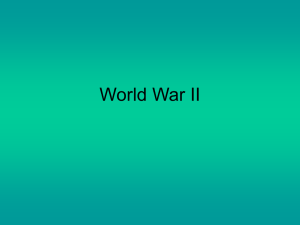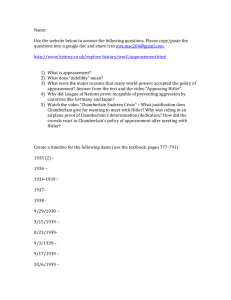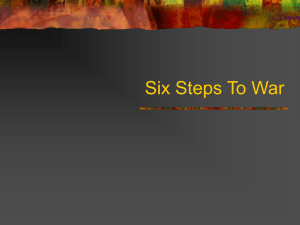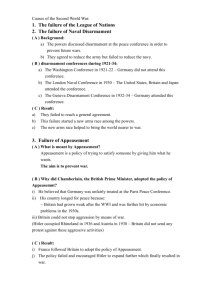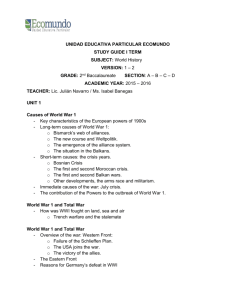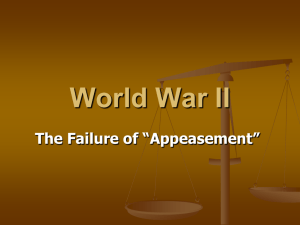File - Campbell's Web Soup
advertisement
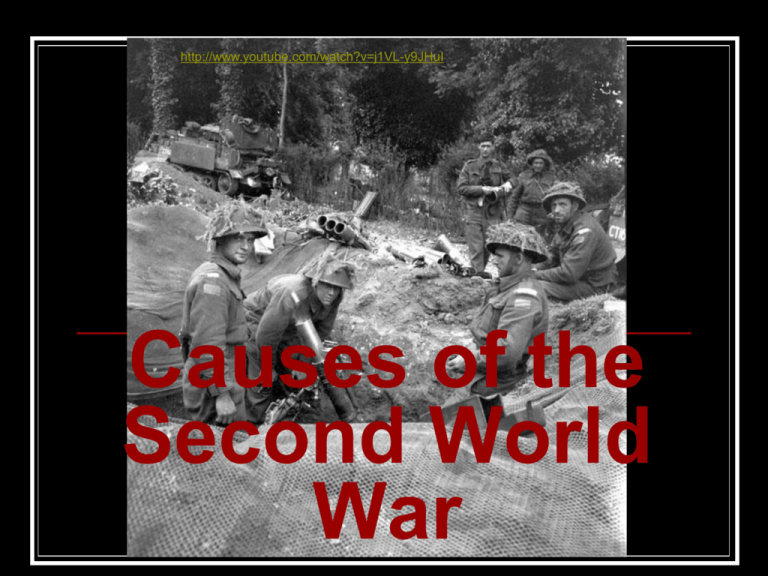
http://www.youtube.com/watch?v=j1VL-y9JHuI Causes of the Second World War Fundamental / Underlying Causes 1) The Treaty of Versailles War Guilt Clause & reparation payments made Germany bitter; forced to cede certain territories 2) The Great Depression Economic crisis put countries in chaos – Hitler and Mussolini used this to their advantage Treaty of Versailles Clauses directed at Germany: Give up all colonies Give up Alsace Lorraine, Saar Valley; Rhineland to be demilitarized New countries: - Czechoslovakia - Poland - Austria ** German speaking peoples of whom Hitler wanted to unite Fundamental / Underlying Causes – cont’ 3) The Rise of Fascism, Extreme Nationalism, & Imperial Aggressiveness Hitler & Mussolini – powerful leaders who were: Nationalistic, militaristic, imperialistic Promise to lead people out of difficult times Japan – invaded Manchuria (in China) -1931 Italy – invaded Ethiopia – 1935 Germany – reoccupied Rhineland (1936), annexed Austria (1938), and seized Sudetenland in Czechoslovakia Return of Imperialism Fundamental / Underlying Causes – cont’ 4) The Failure of the League of Nations Lacked key members (USA and USSR at first) Inability to enforce decisions left it restricted in effectiveness Nations lost confidence in “collective security” Hitler pulled out of League Fundamental / Underlying Causes – cont’ 6) Lack of Sympathy for Jewish People Failure of Britain and France to help out German Jews or to recognize that the treatment they were receiving was more than a domestic problem Most nations of the world (including Canada) were unsympathetic to Jewish People SS St. Louis Incident - 1939 Immediate Causes 1) Appeasement Crises – 1936-1939 British PM Chamberlain and Adolf Hitler - 1938 Appeasement – policy whereby when a country becomes aggressive, other countries give the aggressor what it wants just to prevent another war Britain and France – practiced appeasement with Hitler until 1939 Appeasement Policy of Appeasement – Gave in to Germany’s demands in hopes to avoid conflict British PM Neville Chamberlain argued appeasement policy preferable to war Appeasement Crises – cont’ a) Re-militarization of the Rhineland Treaty of Versailles – forced Germany to remove all military presence from Rhineland (which borders France) March 1936 – Hitler sent troops into Rhineland, but Britain and France did nothing Appeasement Crises – cont’ b) Annexation of Austria Annexation – to make something a part of a greater whole March, 1938 – German troops moved into Austria and made it part of Germany • In direct violation of Treaty of Versailles • Democracies did nothing Appeasement Crises – cont’ c) Appeasement in Czechoslovakia When Czechoslovakia was created – over 3 million Germans were included in its boundaries in area called Sudetenland Hitler wanted these Germans “reunified” with Germany September, 1938 - Crisis came to a head Appeasement Crises – cont’ c) Czechoslovakia – cont’ After making demands regarding the Sudetenland, Hitler threatened invasion on October 1st Britain and France panicked because this could lead to war Called Conference in Munich, Germany Leaders at Munich Conference Appeasement Crises – cont’ c) Czechoslovakia – cont’ – Munich Conference – cont’ Appeasers gave Hitler Sudetenland in exchange for not invading the rest of Czechoslovakia Wishes of Czechs completely ignored • Benes, Czech PM, not even allowed at Conference The famous photo from the Munich Conference 1938 is that of Neville Chamberlain holding up a scrap of paper and claiming to have secured "peace in our time". • British PM Chamberlain returned to England proclaiming a great victory Appeasement Crises – cont’ c) Czechoslovakia – cont’ – March 15th, 1939 - Appeasement Policy came crashing down when Germany invaded the rest of Czechoslovakia Another European war was now unavoidable http://www.youtube.com/watch?v=gR8lSozEbcs German Troops enter Prague March 15, 1939 2) NAZI-Soviet Pact and WWII Prior to WWII – Britain and France unwilling to cooperate with communist Stalin to try to “scare” Hitler Stalin tried to convince Britain and France to “scare” Hitler into stopping – they turned him down Hitler – goal was to eradicate communism, so Stalin’s fears justified 2) NAZI-Soviet Pact and WWII – cont’ Non-Aggression Pact – Aug 1939 Agreement to not attack each other, and to divide Poland between them Both sides knew they were lying about the nonaggression part of pact, but they signed it to gain time: Hitler wanted to avoid a 2Front war when he attacked Poland Stalin wanted to buy time to prepare for war Essentially: this pact cleared the way for Hitler to start WWII The Last Straw: Germany’s Invasion of Poland - 1939 September 1, 1939 – WWII began with German invasion of Poland NAZIs used the “blitzkrieg” (“lightning warfare”) method Airplanes led attack to knock out key enemy positions Immediately followed by tank & motorized infantry attacks Attacking forces swept past enemy, then close in behind, thereby trapping them NAZIs swept through Poland, encountering little resistance http://www.youtube.com/watch?v=gUjrnlMAtQ4 Appeasement No Longer: Declarations of War 1) France & Britain immediately declared war on Germany 2) Canada declared war one week later (September 10th) Parliament voted and decided to join war NOT automatic like in WWI Leaders in Quebec supported Canada’s entry into war based on PM King’s promise that conscription (compulsory military service) would never be required
